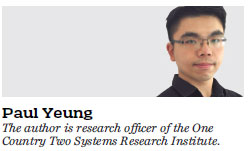Seeds for Mong Kok riot sown years ago in HK
Updated: 2018-06-14 06:58
By Paul Yeung(HK Edition)
|
|||||||
The Mong Kok riot court case has drawn huge public attention after activist leader Edward Leung Tin-kei was sentenced to six years in prison by the High Court on Monday for his role in the riot. There are two opposing views toward the sentence. The first strongly believes Leung should accept the legal consequences for his illegal acts and it is necessary for the judge to deliver a clear message to society that any violence will not be tolerated. However, there are also opinions that the sentence is too harsh and the ruling has failed to take Leung's motives into account.
The existence of diverse views is not surprising at all, given people's diverse political stances. What is worrisome is that the opposing views threaten to split Hong Kong society, a situation reminiscent of the bitter social divisiveness Hong Kong suffered after the illegal "Occupy Central" movement. Along with Leung, co-defendant Lo Kin-man was handed down a seven-year prison term, the heaviest punishment so far for a participant in the 2016 Mong Kok riots. But public attention has focused on Leung. Some sympathizers lost their objectivity when commenting on Leung's sentence because of his political belief. They need to remind themselves that the rule of law is one of Hong Kong's core values and does not accept political reasons as an excuse for breaking the law. Instead of obsessing over the sentence of a stray political figure, we should ask a more important question: Could the tragedy be prevented in the first place? Can we change the past?

Let's look back two years when society was split after a political dispute over electoral reform led to "Occupy Central". Society lacked harmony. According to the Public Sentiment Index released by Hong Kong University, the score at the beginning of 2016 was 52.8 in a 0 to 200 range where 100 means normal. The Public Sentiment Index aims to quantify Hong Kong people's sentiments, explain and predict their likely collective behavior. The 52.8 score was a 20-year low which implied society was at a high risk of collective action. It seems the tragedy that happened several weeks later was hard to avoid at that moment.
Let's move further back to 2010. At that time, the Chinese University of Hong Kong released a survey on social harmony. The findings warned that public opinion for the first time agreed Hong Kong is not a harmonious society. Political conflicts and government-society discrepancy were highlighted as the two most-deteriorating factors. Worse, 25.9 percent of respondents agreed to use radical means to push the government to respond to their appeals. It seems the seeds of the riot had begun to grow but society did not pay enough attention.
Political actors have two choices. The first one is to rein in the horse (social antagonism) on the brink of the precipice and promote social harmony as soon as possible. The second one is to use the public sentiment to gain political interest. The pro-establishment camp took the former but the opposition camp took the latter. The story continued as the opposition political force tried to use more and more radical means to motivate the public to serve their agenda. Worse, the poor political atmosphere obstructed government plans which are beneficial to the society. As a result, social problems remained unsolved and social divisiveness was further aggravated. Social harmony kept deteriorating amid political deadlocks.
The Mong Kok riots arose from such background. It is sad that we cannot change the past. The deterioration of social harmony led to the tragic consequences, as described in the sentencing by Judge Anthea Pang Po-kam. She said the riot that broke out on two busy Hong Kong streets - Argyle Street and Portland Street in Mong Kok - was an "organized crime", "large scale and extremely serious" as it was carried out by a group of more than 200 people, most of whom were masked and carried weapons. In the incident, about 130 people were injured. Moreover, 91 people have been arrested in connection with the Mong Kok riot, and 28 have been convicted.
It is never too late to prevent another riot if we put more effort into improving social harmony. The judge stressed that the court would never let people resort to illegal means to pursue political causes, nor would political causes become reasons to mitigate violent acts. It is just in a legal sense. But in a political sense, we may learn from Buddha's teaching: "Conquer anger by non-anger. Conquer evil by good. Conquer miserliness by liberality. Conquer a liar by truthfulness."
(HK Edition 06/14/2018 page9)